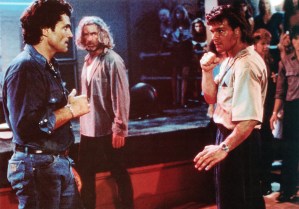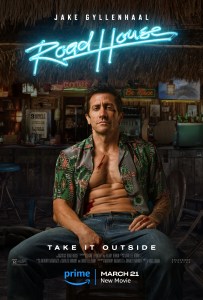Editors note: From his breakout in Swingers to The Bourne Identity, Mr. and Mrs. Smith, Edge of Tomorrow, American Made and his upcoming film with Tom Cruise they plan to shoot in outer space, Doug Liman‘s films have a kinetic energy. That made the director perfect for Road House, an edgier version of the 1989 beloved B movie that starred Patrick Swayze, Kelly Lynch, Sam Elliott and Ben Gazzara. Jake Gyllenhaal, who got back in similar chiseled mode he displayed in the boxing movie Southpaw, plays the bouncer who has never lost a fight. Liman feels his movie, which will be announced as SXSW‘s opening-night film, has been KO’d by Amazon MGM Studios with a Prime Video release, and he’s not taking it lying down. In this guest column, he explains what happened, why he feels betrayed, and why this is a cautionary tale for a theatrical film business still recovering from the pandemic and the rise of streamers. Buckle up.
***
When Road House opens the SXSW film festival, I won’t be attending. The movie is fantastic, maybe my best, and I’m sure it will bring the house down and possibly have the audience dancing in their seats during the end credits. But I will not be there.
My plan had been to silently protest Amazon’s decision to stream a movie so clearly made for the big screen. But Amazon is hurting way more than just me and my film. If I don’t speak up about Amazon, who will? So here we go.
When Amazon bought MGM, one of the few remaining studios making big commercial films for theatrical release (movies like Bond, Creed) they announced that they would put a billion dollars into theatrical motion pictures, releasing at least 12 a year. They touted it as “the largest commitment to cinemas by an internet company.” I can tell you what they then did to me and my film Road House, which is the opposite of what they promised when they took over MGM.
The facts: I signed up to make a theatrical motion picture for MGM. Amazon bought MGM. Amazon said make a great film and we will see what happens. I made a great film.
We made Road House a “smash hit” – Amazon’s words not mine, btw. Road House tested higher than my biggest box office hit, Mr. and Mrs Smith. It tested higher than Bourne Identity, which spawned four sequels. I’m told the press response has been Amazon’s best since they bought MGM. Road House has a strong tie-in to the UFC, which has a rabid and loyal fan base that has spawned over 1.5 billion social media impressions for the film, and marketing hasn’t even started yet. The action is ground-breaking. And Jake Gyllenhaal gives a career-defining performance in a role he was born to play. Audiences will want to see UFC mega-star Conor McGregor take his debut swing at Jake on the big screen. The reality is there’s nothing quite so fun as a good bar fight.
What else could I have delivered to the studio? Nothing, it turns out. Because contrary to their public statements, Amazon has no interest in supporting cinemas. Amazon will exclusively stream Road House on Amazon’s Prime. Amazon asked me and the film community to trust them and their public statements about supporting cinemas, and then they turned around and are using Road House to sell plumbing fixtures.
That hurts the filmmakers and stars of Road House who don’t share in the upside of a hit movie on a streaming platform. And they deprive Jake Gyllenhaal — who gives a career-best performance — the opportunity to be recognized come award season. But the impact goes far beyond this one movie. This could be industry shaping for decades to come.
Jake Gyllenhaal in “Roadhouse”
Amazon MGM Studios
If we don’t put tentpole movies in movie theaters, there won’t be movie theaters in the future. Movies like Road House, people actually want to see on the big screen, and it was made for the big screen. Without movie theaters, we won’t have the commercial box office hits that are the locomotives that allow studios to take gambles on original movies and new directors. Without movie theaters we won’t have movie stars.
Film executives are also at risk. Box office revenues are the war chests that allow studios the resources to make movies. It’s no surprise you see layoffs across the industry including at Amazon – without movies in theaters, there’s no revenue coming in. And once the theaters go out of business, it could take decades for the business to recover, if ever.
At the height of the pandemic there was a real possibility that movie theaters would not recover. We got comfortable watching movies at home. But then a remarkable thing happened when restrictions lifted. We started going back to the movie theater.
The fact that we still have movie theaters after the global pandemic didn’t happen by accident. It happened because brave filmmakers like Chris Nolan and Tom Cruise insisted their movies play in the theater, and they proved audiences are still there. They proved that despite everything, we still enjoy gathering and sharing in the communal experience of watching a film together. People love going to the movies, despite the convenience of streaming. They are not mutually exclusive. In fact, data shows that movies do better on streaming if they have been released theatrically first.
I’m not opposed to streaming movies. I made one of Amazon’s first original movies for streaming, and during the pandemic sold a streaming movie to Warner Bros. I’m currently making Instigators for Apple. But I am opposed to Amazon gutting MGM and its theatrical business, as I would have been had Jeff Bezos bought the Washington Post and then gutted its newsroom (he did the opposite).
I like the Amazon film execs and believe they are good people who are trying to do their best. They have a lifetime of experience making and releasing films in theaters. We tried everything to convince them to put Road House in theaters – they know all the arguments I presented here. I even asked them to allow me to sell Road House to another studio that would put it in theaters – they said no. Maybe they are victims in this as well, forced to betray the artists they spent their careers supporting.
The reality is there may not be a human villain in this story – it may simply be an Amazon computer algorithm. Amazon will sell more toasters if it has more subscribers; it will have more subscribers if it doesn’t have to compete with movie theaters. A computer could come up with that elegant solution as easily as it could solve global warming by killing all humans.
But a computer doesn’t know what it is like to share the experience of laughing and cheering and crying with a packed audience in a dark theater – and if Amazon has its way, future audiences won’t know either.

(L-R) Marshall Teague, Sam Elliott and Patrick Swayze in 1989’s ‘Road House’
United Artists/courtesy Everett Collection

